2000 Toyota Tacoma Tires & Services
Get Started
Complete Auto Care for Your 2000 Toyota Tacoma
-
TIRES FOR YOUR 2000 Toyota Tacoma View Tire Info GET TIRE PRICING
-
REPAIR FOR YOUR 2000 Toyota Tacoma View Repair Info SCHEDULE REPAIR
-
MAINTENANCE FOR YOUR 2000 Toyota Tacoma View Maintenance Info SCHEDULE MAINTENANCE
-
OFFERS FOR YOUR 2000 Toyota Tacoma Limited Time Tire Offers VIEW ALL COUPONS
2000 Toyota Tacoma Tires
Recommended Tires | Tire Information
2000 Toyota Tacoma Tires Sizes, Speed Ratings, and Inflation
Not sure about your 2000 Toyota Tacoma tire size? Use the following chart to find information on tire size, speed rating, and inflation.
| Trim Level | Speed Rating | Inflation in PSI F/R | Tire Size |
|---|---|---|---|
| 2000 Toyota Tacoma Base* | None | 26 PSI/29 PSI | 31x10.50R15LT/C |
| 2000 Toyota Tacoma Base* | S | 29 PSI/35 PSI | P195/75R14 |
| 2000 Toyota Tacoma Base* | S | 29 PSI/35 PSI | P215/70R14 |
| 2000 Toyota Tacoma Base* | S | 26 PSI/29 PSI | P225/75R15 |
| 2000 Toyota Tacoma Base* | S | 26 PSI/26 PSI | P265/75R15 |
| 2000 Toyota Tacoma SR5* | None | 26 PSI/29 PSI | 31x10.50R15LT/C |
| 2000 Toyota Tacoma SR5* | S | 29 PSI/35 PSI | P215/70R14 |
| 2000 Toyota Tacoma SR5* | S | 26 PSI/29 PSI | P225/75R15 |
| 2000 Toyota Tacoma Limited* | S | 26 PSI/29 PSI | P225/75R15 |
| 2000 Toyota Tacoma Limited* | None | 26 PSI/29 PSI | 31x10.50R15LT/C |
| 2000 Toyota Tacoma Pre Runner | S | 26 PSI/29 PSI | P225/75R15 |
|
2000 Toyota Tacoma Base* Speed Rating: None Inflation F/R: 26 PSI/29 PSI |
|
2000 Toyota Tacoma Base* Speed Rating: S Inflation F/R: 29 PSI/35 PSI |
|
2000 Toyota Tacoma Base* Speed Rating: S Inflation F/R: 29 PSI/35 PSI |
|
2000 Toyota Tacoma Base* Speed Rating: S Inflation F/R: 26 PSI/29 PSI |
|
2000 Toyota Tacoma Base* Speed Rating: S Inflation F/R: 26 PSI/26 PSI |
|
2000 Toyota Tacoma SR5* Speed Rating: None Inflation F/R: 26 PSI/29 PSI |
|
2000 Toyota Tacoma SR5* Speed Rating: S Inflation F/R: 29 PSI/35 PSI |
|
2000 Toyota Tacoma SR5* Speed Rating: S Inflation F/R: 26 PSI/29 PSI |
|
2000 Toyota Tacoma Limited* Speed Rating: S Inflation F/R: 26 PSI/29 PSI |
|
2000 Toyota Tacoma Limited* Speed Rating: None Inflation F/R: 26 PSI/29 PSI |
|
2000 Toyota Tacoma Pre Runner Speed Rating: S Inflation F/R: 26 PSI/29 PSI |
* Note: these models have different tire sizes depending on vehicle options.
Recommended Tires for Your 2000 Toyota Tacoma
What tires are best for a 2000 Toyota Tacoma? Check out the following tire brands and types.
 Destination LE3
Destination LE3
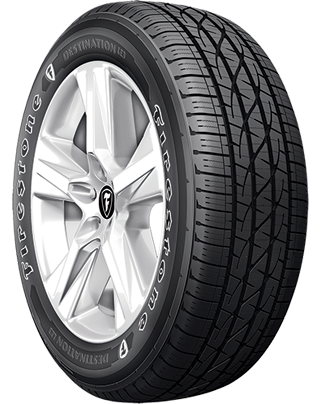
- No warranty
- All-Season
- Light Truck Tires
 Destination M/T2
Destination M/T2
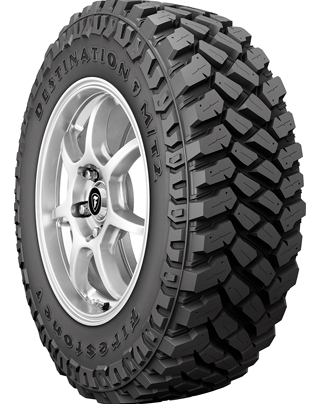
- No warranty
- All-Season
- Light Truck Tires
 Destination X/T
Destination X/T
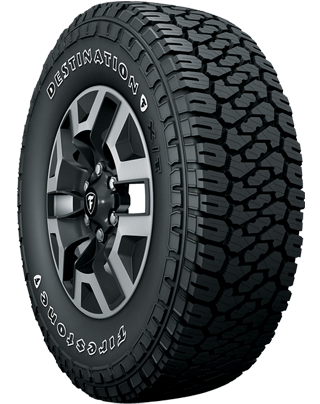
- Gold Pledge Limited Warranty
- All-Season
- Light Truck Tires

- No warranty
- All-Season
- Passenger Tires
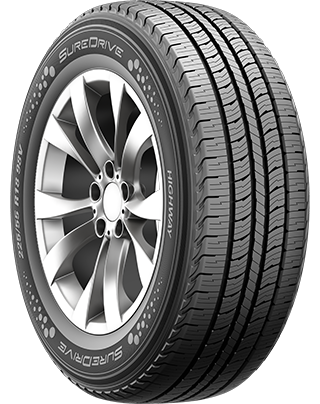
- No warranty
- All-Season
- Light Truck Tires
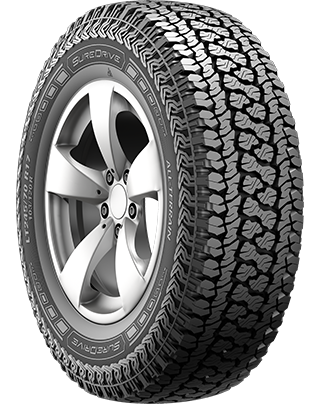
- No warranty
- All-Season
- Light Truck Tires
 OPEN COUNTRY A/T III
OPEN COUNTRY A/T III
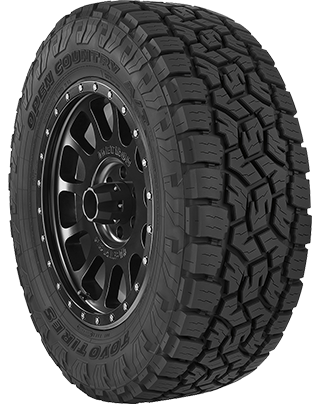
- No warranty
- All-Season
- Light Truck Tires
 Extensa A/S II
Extensa A/S II

- No warranty
- All-Season
- Passenger Tires
 OPEN COUNTRY M/T
OPEN COUNTRY M/T
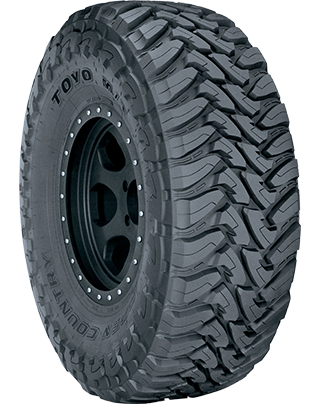
- No warranty
- All-Season
- Light Truck Tires
 OPEN COUNTRY R/T
OPEN COUNTRY R/T
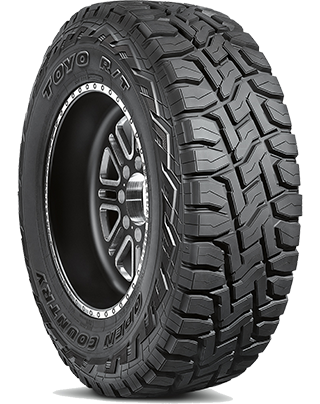
- No warranty
- All-Season
- Light Truck Tires
About 2000 Toyota Tacoma Tires
Apart from finding the right tire size, you also want to consider a handful of other factors when buying new Toyota Tacoma tires like how and where you drive, and how much you want to spend. Think about where you live (countryside vs. city vs. mountains) and the kind of unexpected weather you're likely to experience when evaluating your driving conditions. Drivers in states that fully experience all four seasons often buy two sets of tires: one for winter and one for summer. Other drivers prefer the convenience of all-season tires. They make one trip to the tire shop and they're pretty much ready for rain, light snow, or sun!
Next, consider your driving style. If you're an avid off-roader who yearns to pioneer new paths, you have very different tire needs than a highway commuter who doesn't hit the hills very often. Browse Toyota Tacoma tires online or come to your nearby Firestone Complete Auto Care for help selecting the tire that's right for you.
2000 Toyota Tacoma Tire Installation & Rotation
We sell tires, but we also service them and care for all the around-the-wheel components. We're a tire store that also offers professional tire installation, maintenance, and rotation, along with complete auto care. Shop 2000 Toyota Tacoma tires online and schedule an installation appointment.
2000 Toyota Tacoma Tire Questions
-
Why check Toyota tire inflation? A small decrease in tire pressure can have a big impact on your driving. Maintaining proper tire pressure can help improve braking time, increase fuel economy, and boost tire lifespan.
-
What do the numbers on my Toyota Tacoma tires mean? Your tire sidewall gives you information about load carrying capacity, speed rating, treadwear, traction, and tire size. Talk to one of our tire technicians to learn how to read the numbers on your tire!
-
Can I check the tread depth on my Toyota tires at home? Stay on top of your tire tread depth to help avoid a dangerous drive. You can check tread depth with a penny. Hold the penny so that Abraham Lincoln is facing you, then place your penny into a tread groove upside down. If you can see the top of Abe’s head, your tread is shallow and it might be time for new Toyota Tacoma tires. Grab a penny. Hold the so that Abe Lincon's head is facing you and his hair is pointing toward the ground. Then, place the penny into a tread groove. If you can see the top of Abe’s head, your tread is shallow and it might be time for new Toyota Tacoma tires.
Types of 2000 Toyota Tacoma Repairs
When to repair, when to replace? Click on a repair below to learn more about Toyota Tacoma repairs at Firestone Complete Auto Care.
Get Repairs for Your 2000 Toyota Tacoma
No driver looks forward to car repairs. But at Firestone Complete Auto Care, we strive to give you the excellent repair experience you deserve. Bring your 2000 Toyota Tacoma in for repair services and our skilled repair technicians will get your Tacoma back on the road. Before we begin any repair work, we’ll diagnose any issues and answer your questions about potential repair options. If a repair isn't necessary, we won't recommend it.
How Much Are Toyota Tacoma Repairs?
Several factors can affect the cost to repair your 2000 Toyota Tacoma, including what kind of repair you need, costs of replacement parts or repair supplies, the labor involved, and the state you live in. No matter what state you’re in, be sure to look through our offers and online coupons for repairs.
A few different aspects can influence repair costs for your 2000 Toyota Tacoma, like
2000 Toyota Tacoma Auto Repair Questions
-
Do I need to follow Toyota's maintenance schedule? One of the best ways to prevent 2000 Toyota Tacoma repairs is by staying on top of your Toyota maintenance schedule. This schedule is written by the people who made your vehicle and they know best how to keep it running smoothly.
-
What's wrong if something feels 'off' in my Toyota? You’re in your car, day in and day out. So, it’s only expected that you know your car better than anyone else! If you notice mysterious smells, strange engine noises, or other out-of-the-ordinary symptoms while driving, trust your instincts and stop into Firestone Complete Auto Care for a Courtesy Check. Catching a potential issue early could help prevent Toyota Tacoma repairs.
-
Do I have to get the repairs you recommend for my Toyota? We won’t recommend a service or repair for your 2000 Toyota Tacoma unless we think it’s necessary to keep you safe. Want to know more about a specific recommended repair? Ask! We’re here to help.
Get Your 2000 Toyota Tacoma Brakes Fixed
You might have a strong and reliable engine in your Toyota Tacoma. But if you can't stop it, then it's scrap metal. If you notice your brakes are squeaking or not working well, don’t wait! Safe driving is difficult when your brakes are anything but their best. Plus, waiting can lead to more expensive parts wearing out and requiring replacement. Visit Firestone Complete Auto Care for the right brake repair for your 2000 Toyota Tacoma. We offer a variety of brake services like brake pad/shoe replacement, brake rotor/drum refinishing, brake fluid exchange/bleeding, and brake caliper and wheel cylinder installation.
Toyota Tacoma Brakes Frequently Asked Questions
-
Why does my Tacoma shake when I brake? Faulty brake calipers, worn brake pads or rotors, loose or worn suspension parts, and warped rotors can cause your Tacoma to shake during braking. If you’re experiencing odd brake behavior, schedule a free brake inspection at a nearby Firestone Complete Auto Care.
-
How long should my Tacoma brake pads last? You can usually get around 30,000 to 40,000 miles out of your brake pads, but how and where you drive your Tacoma can affect this. Hauling large loads or riding your brakes can shorten their lifespan, while smoothly braking and mostly sticking to highways can help your brake pads last longer.
-
Should my Tacoma be leaking brake fluid when the car is off? Your Tacoma brake system is a closed hydraulic system, so a brake fluid leak likely means you have an issue in your brake system. Over time, brake components can wear out or get damaged, causing a brake fluid leak.
2000 Toyota Tacoma Drivetrain Repairs
Drivetrains for front, rear, and all-wheel-drive and 4WD vehicles are not all the same. You don't want to go to any random shop for drivetrain repair. You want to go to Firestone Complete Auto Care. We can take care of most 2000 Toyota Tacoma drivetrain components Your Tacoma might need driveshaft repair if you notice heavy vibrations in your floorboards, clunks when shifting, resistance when turning, or vibration as your vehicle accelerates.
2000 Toyota Tacoma Drivetrain Q&A
-
How do I know if my Toyota drivetrain is damaged? Noises toward the back of your Toyota Tacoma, leaking fluid, trouble turning — these could all be signs of drivetrain damage you want to address. Take action before something more severe happens.
-
What triggers the malfunction indicator light (MIL) in a Tacoma? Engine problems, transmission problems, faulty sensors, electrical issues, misfire issues, and connector problems could all cause your Tacoma’s malfunction warning light, or better known as the check engine light, to illuminate.
-
How concerning is a drivetrain malfunction in my Tacoma? If your Tacoma has a drivetrain malfunction, don't wait. Get it checked out by a professional mechanic. Identifying the underlying cause and performing the appropriate repairs right away can help prevent further damage and avoid unsafe driving conditions.
2000 Toyota Tacoma Wheel Alignment
With an alignment service, adjustments are made to your Toyota Tacoma’s suspension system, which connects the wheels with the rest of the vehicle. During the service, calculated changes are made to the angles of your tires. This is so that your tires hit the road at an optimal angle for your vehicle’s performance — just as Toyota intended. Before we adjust the alignment of your 2000 Toyota Tacoma, we’ll start by checking the current alignment angles. After that, we can adjust your wheel alignment angles until they match Toyota’s recommended measurements.
Toyota Tacoma Alignment Questions
-
Are there road conditions that can hurt my Toyota Tacoma alignment? When it’s safe to do so, avoid driving over potholes or hitting curbs. These road obstacles can wreak havoc on your wheel alignment, as can wear and tear from rough road conditions.
-
How often does your Tacoma need a wheel alignment? Generally, it’s wise to have your alignment looked at around every 6,000 miles or 6 months, whichever happens first. You should check your Tacoma owner’s manual to verify Toyota’s suggested interval.
-
Do you need to get your Tacoma wheels aligned? While you don’t necessarily need to get an alignment when putting new tires on your Tacoma, it’s still a good idea. Ensuring your wheels are properly aligned can help support optimal handling, tire wear, and fuel efficiency.
2000 Toyota Tacoma Engine Repair
If your 2000 Toyota Tacoma needs engine repair, our technicians will make sure you understand what’s going on before they start working on your engine. We don't start working until we have your approval. If a service can wait, we’ll make sure you know. We'll also tell you if it's necessary for your safety. We want to give you all the details you need to make an informed decision about your engine repairs. Choose Firestone Complete Auto Care for Toyota Tacoma engine repairs and you can feel good knowing that we only use Toyota-compliant replacement parts such as the serpentine belt, engine oil seal, ignition coil, or a different component.
Questions About 2000 Toyota Tacoma Engines
-
Why does the check engine light in my Tacoma turn on when I start my car? It’s usually normal for your check engine light to turn on upon ignition. This is just your Tacoma testing its circuits. The dash light shouldn't stay on. If it does, you might want to bring your vehicle in for service.
-
Why is my Toyota Tacoma making engine noise? Strange engine sounds can be a sign something’s off in your Toyota Tacoma. Knocking or tapping could be a symptom of low oil. A high-pitched whistle could signal an intake leak or misaligned belt. Squealing can be traced back to a loose fan belt, and grinding might be a sign of brake problems rather than engine issues.
-
What could damage a Toyota engine? Certain driving habits can damage your engine and should be avoided. These habits include 'running on fumes,' revving the engine while still in Park, or pushing 'the pedal to the metal' before the engine has warmed up. Help sustain your engine’s performance and efficiency by staying miles away from these bad driving practices.
Tire Repair for Your 2000 Toyota Tacoma
If the road has been rough on your 2000 Toyota Tacoma tires, Firestone Complete Auto Care can help. In some cases, a tire doesn’t have to be replaced – it can be plugged and patched with a simple repair. Depending on the damage, though, a repair might not be the right move. Our technicians can determine which option is best for your situation. To start, we’ll consider the location of tire damage, the type of issue, the size and scope of the damage, and the amount of wear on your tires.
If your 2000 Toyota Tacoma tire puncture can be repaired, we’ll get to work on the steps to fix it: (1) Take the tire off the wheel for easy inspection, (2) fill the puncture to keep the moisture out, and (3) secure and seal the inner tire liner to ensure the tire is airtight.
Your Questions About Toyota Tacoma Tire Repair, Answered
-
What happens if I drive my Toyota on a flat tire? A flat tire that’s not addressed can take a terrible toll on the rest of your car. Until you have it repaired or replaced, drive your Tacoma as little as possible to reduce your risk of damage to the wheels and alignment – or further damage to that already struggling tire!
-
Can I use an emergency/temporary sealant to fix my Toyota's flat tire? A temporary sealant may be able to help you get to a repair location safely. But temporary or emergency sealants could possibly damage TPMS sensors, and in some cases may even void the warranty on your Bridgestone or Firestone tires. If your tire needs extensive repair, sealant can add time and labor costs to the process.
-
What can cause Tacoma tires to keep losing air? Possible reasons for your Tacoma tires continuously losing air include a leaking valve steam, wheel damage, and a puncture or hole in the rubber.
Maintenance for Your 2000 Toyota Tacoma
Take care of your Toyota Tacoma and it'll take care of you. With the right maintenance at the right time, your Tacoma has a good chance of hitting 200,000 miles or more.
Guide to 2000 Toyota Tacoma Scheduled Maintenance
Instead of waiting for an issue to arise with your Tacoma, you can stay ahead of problems before they even begin. It’s as easy as following the recommended maintenance schedule that’s been written specifically for your 2000 Toyota Tacoma! The recommended maintenance schedule is put together by Toyota, your vehicle manufacturer. Driving conditions, climate variations, and other variables can affect which scheduled maintenance services you’ll need; however, there’s a good chance that your vehicle’s recommended maintenance services will include oil changes, tire rotations, brake pad replacement, filter changes, and fluid checks and exchanges. Keeping up with routine service appointments is a great way to keep your Tacoma running for longer, keep you safer on the road, and prevent common 2000 Toyota Tacoma problems.
Essential Maintenance to Keep Your 2000 Toyota Tacoma Running Newer, Longer
Bring your 2000 Toyota Tacoma to Firestone Complete Auto Care for factory-recommended maintenance services and an expert technician will begin by performing a Courtesy Check. This Courtesy Check can establish a baseline of what may need to be addressed during your service appointment. Every Courtesy Check will include a visual inspection of your Tacoma. We’ll check your head and tail lights, fluid levels, filters, tires (and their alignment!), and windshield wiper blades. We’ll also perform a free battery check to determine your battery’s charge level.
Firestone Complete Auto Care is the place to go for 2000 Toyota Tacoma maintenance. Don’t wait until something goes wrong with your car. Visit your nearest location for proactive maintenance today.
Questions About 2000 Toyota Tacoma Maintenance
-
When should I have Toyota Tacoma alignment checked? Watch out for pothole damage. If your 2000 Tacoma is pulling to one side or the other, your tires or suspension system could be calling out for help.
-
When should I use high mileage oil in my Toyota Tacoma? If your Toyota Tacoma has ticked past 75,000 miles, consider switching to high mileage oil at your next oil change to give your engine what it needs to go another 75,000 (or more!). High mileage oil: make it a high priority!
-
Why are my Toyota dashboard lights on? It's better to get them addressed as soon as possible. An illuminated dashboard light means something in your vehicle isn't functioning like it should. Letting problems linger can mean bad news for your Toyota Tacoma, so be sure to take your car in for service as soon as you notice an illuminated dashboard light.
The Right Battery Size for a 2000 Toyota Tacoma
Researching battery replacements for your Toyota Tacoma?
| Battery | Engine | Warranty | Cold Cranking Amps | |
|---|---|---|---|---|
| 24F-3 | L4/2.4L | Replacement 24 months | Performance months | 650 |
| 24F-6 | L4/2.4L | Replacement 36 months | Performance months | 750 |
| 24F-RP | L4/2.4L | Replacement 48 months | Performance months | 750 |
| 35-1 | V6/3.4L | Replacement 24 months | Performance months | 500 |
| 24F-6 | V6/3.4L | Replacement 36 months | Performance months | 750 |
| 24F-RP | V6/3.4L | Replacement 48 months | Performance months | 750 |
| 24F-3 | L4/2.7L | Replacement 24 months | Performance months | 650 |
| 24F-6 | L4/2.7L | Replacement 36 months | Performance months | 750 |
| 24F-RP | L4/2.7L | Replacement 48 months | Performance months | 750 |
Car Batteries for 2000 Toyota Tacoma
The average car battery lasts three to five years. Check your battery regularly and replace it as needed so it doesn’t leave you and your Toyota Tacoma stranded. Look out for symptoms of a faulty car battery. A slow engine crank, an illuminated check engine light or battery signal, swollen battery case, corrosion-covered posts, and subpar electrical performance may all indicate that your battery is on its last leg.
You can also get a Free Battery Test at your local Firestone Complete Auto Care. Drop in for a free battery check and, if needed, get your Toyota Tacoma a replacement battery. Car batteries are one of our many specialties! Our technicians are well-acquainted with Toyota’s service specs for Tacoma car batteries’ reserve capacities and cold cranking amps. Get help choosing the battery size that fits your car perfectly, and schedule a fast car battery replacement at your earliest convenience.
Commonly Asked Toyota Tacoma Battery Questions
-
Why doesn’t my Toyota Tacoma battery stay charged? A battery is in its final hour when it will no longer hold a charge. The battery may be too old. Or, you may have been leaving your car doors ajar and the cabin light at night. Stop by for a complimentary battery check at your favorite Firestone Complete Auto Care and get a handle on your car battery’s health.
-
What is the average lifespan of a car battery? The typical 12-volt car battery may last three to five years, depending on the type of battery, the driving conditions, and how well the battery is maintained.
-
What is the white, crusty stuff around my Tacoma’s battery post? If you notice white, crusty stuff around the battery terminals of your Tacoma, it's likely corrosion. A chemical reaction between battery acid and the air can create a white, powdery substance that builds up over time on the terminals. This buildup can interfere with the electrical connection between the battery and your Tacoma’s electrical system, potentially leading to poor performance, difficulty starting, and other issues.
2000 Toyota Tacoma Oil Change Service
Your 2000 Tacoma’s oil should be changed according to Toyota’s recommended oil change intervals. Outside of Toyota-recommended oil change intervals, your Tacoma may need an oil change if your check engine light is on, you hear engine knocking, sense an oil smell in the cabin, or see an excess amount of vehicle exhaust. You might need an oil change more frequently than what’s recommended by Toyota if you regularly haul heavy loads, drive in dusty areas, go off-roading a lot, or go long distances at low speeds.
Your local Firestone Complete Auto Care has the right 2000 Toyota Tacoma motor oil: either synthetic or conventional. Talk with a teammate and consult your owner's manual before picking a motor oil. At Firestone Complete Auto Care, you can choose from the following oils: Quaker State® Advanced Durability™ conventional oil, Pennzoil® High Mileage Vehicle® motor oil, Pennzoil Platinum® Full Synthetic motor oil with PurePlus™ Technology, and Shell Rotella® heavy-duty engine oil. During an oil change, one of our techs will change your Tacoma’s oil, replace and recycle your used oil and oil filter, inspect the rest of your car’s filters, top-off essential fluids, and perform a courtesy inspection on your entire vehicle. Get professional engine care by making an oil change appointment for your Tacoma today.
2000 Toyota Tacoma Oil Change Questions
-
What can cause the oil light on my Toyota Tacoma to illuminate? Your Toyota Tacoma oil change reminder light might illuminate if it’s been too long since your last oil change. On the other hand, the oil pressure light might illuminate due to a clogged oil filter, a faulty oil pressure sensor, low engine oil levels, or a malfunctioning oil pump.
-
Can I change my Toyota oil on my own? Changing your own oil isn't as convenient as you might think. It requires special tools and old oil must be disposed of properly. Having your oil professionally changed reduces the chances of something going wrong with the oil change, but also with your vehicle down the road.
-
Why is my Toyota Tacoma exhaust smoke grayish or blue? You could have an oil leak and have a case of burning oil. Looks like it’s time for a professional to take a look. The leak could be the result of worn valve seals, fried piston rings, or old cylinder walls.
Engine Tune-Up Service for Your 2000 Toyota Tacoma
Routine engine tune-ups can bring power back to your Tacoma. The Firestone Complete Auto Care location in your community offers several Toyota Tacoma engine tune-up services. The first is the standard Firestone Tune-Up. It includes a complete visual inspection of engine components, installation of new spark plugs, and a lifetime warranty on parts*. A second service option replaces the air and fuel filter in your Tacoma. Yet another service is a fuel system cleaning process, which involves removing varnish, dirt, and carbon deposits that have built up inside the fuel injectors, throttle body, and throttle plate in your Tacoma. This can improve your fuel system’s performance (and therefore, your engine’s performance). Consider this when choosing a tune-up service for your Tacoma: your vehicle’s maintenance record and mileage can determine which service is best. Ask one of our technicians what your vehicle needs, based on your driving habits and your car’s current condition.
*Talk to a Firestone Complete Auto Care teammate for full terms and conditions on warranties.
Questions About 2000 Toyota Tacoma Engine Tune-Ups
-
Will it hurt my Toyota Tacoma to drive with old spark plugs? Replace spark plugs on time or about every 30,000 miles or so. Without the spark of electricity created by spark plugs, your engine doesn’t have the combustion it needs to start — which could leave you stranded on the road. Always replace your spark plugs on time based on Toyota’s recommendations.
-
What does a puddle underneath my Toyota Tacoma mean? Puddles could indicate that your vehicle is leaking coolant, oil, or brake fluid. Ignoring these leaks can lead to permanent engine damage, so address these symptoms ASAP with a tune-up service.
-
How frequently do the fuel injectors in my Toyota Tacoma need to be cleaned? The frequency at which car fuel injectors should be cleaned can vary depending on several factors, including the type of fuel used and the driving conditions. Some manufacturers generally recommend a fuel system cleaning as part of your general car maintenance, or as needed based on symptoms of poor fuel system performance.
2000 Tacoma Toyota Steering & Suspension Services
During the first few years you had your 2000 Toyota Tacoma, you and your passengers probably enjoyed a ride that was smooth and balanced. But these days, things are starting to feel a bit rough. Perhaps your Tacoma feels bouncy, drifts to one side, or makes a weird sound when you drive over a speed bump or turn. The first sign of problems is a good time to bring your 2000 Toyota Tacoma in for steering and suspension services. We'll get to the root of the problem and, if your car needs steering and suspension repairs, we’ll explain what your car needs and how much it’ll cost to get it done. We won't begin any work without your permission.
2000 Tacoma Steering & Suspension Q&A
-
What can cause my Toyota Tacoma to have a bouncy ride? If it feels like you’re on a trampoline every time your Tacoma goes over a bump or dip, you may have a problem with your struts or shocks. Faulty shocks and struts can’t properly absorb road bumps, leading to a bouncy ride.
-
Why does my Tacoma front end dip forward when I brake? When you brake, the forward momentum combined with your vehicle's weight sends a lot of force to the vehicle's front end. A bad suspension can cause all that weight and force to push the front end downward.
-
Does treadwear and tire pressure impact my Tacoma's steering and suspension? Proper tire care can reduce strain on the suspension system, and also alert you to the need for new tires. Uneven tire wear is one sign of steering and suspension system problems, but it can also contribute to more.
A/C Service for Your 2000 Toyota Tacoma
Our trained technicians will do what they can to solve your 2000 Toyota Tacoma A/C problems. In this A/C performance inspection, we’ll check out the current condition of your 2000 Toyota Tacoma A/C system to evaluate what repairs are necessary (if any). This check will include an examination of system pressure, a visual inspection, and a leak test.
When we perform an A/C repair on your 2000 Toyota Tacoma, we’ll also do an A/C evacuation and recharge. To do this, one of our technicians will remove the refrigerant in your A/C system (if there is even any left to remove). Then, they’ll perform an evacuation (also known as a discharge) on the entire system per Toyota guidelines. Finally, we’ll recharge the A/C system with new refrigerant.
Frequently Asked Questions for 2000 Toyota Tacoma A/C Systems
-
Why do I get hot air from my Tacoma A/C? If your car’s air conditioning isn’t blowing cold air at all (or it tries, then turns warm), you could have a clogged expansion valve, a faulty compressor clutch, a leak, or a malfunctioning fuse in the system.
-
What causes A/C system leaks? Over the years, the rubber seals and gaskets in your Tacoma’s A/C system naturally degrade. Moisture can get into the system and cause a malfunction, or parts can simply wear out so that your system no longer seals properly.
-
Why does my vehicle have to be moving for my Tacoma’s A/C to work? If your A/C only works when the vehicle is moving, there could be a problem with part of your Tacoma’s A/C or electrical system. Potential issues include low coolant or a faulty cooling fan.
2000 Toyota Tacoma Transmission Service & Repairs
Your transmission carries power from the engine to the wheels so that you can drive at the speed you desire. Since the transmission has to translate the precise amount of power for your desired amount of speed, a small transmission issue can put a big dent in your Tacoma’s performance. Toyota Tacoma transmission problems can present themselves as shifting delays, grinding or jumping during acceleration, a feeling of shakiness, or whistling noises or a burning smell coming from beneath the hood. If you don’t pay attention to Toyota Tacoma transmission trouble you might notice your fuel economy decrease or find that you can't drive your Tacoma at all. Our expert techs are familiar with 2000 Tacoma services and perform them according to Toyota-recommended specifications. If you think there’s something wrong with your Tacoma’s transmission, schedule an appointment at your local Firestone Complete Auto Care to help diagnose, treat, and prevent major transmission issues.
2000 Toyota Tacoma Transmission Questions & Answers
-
Does my Tacoma's transmission fluid need to be inspected? Maintaining your Toyota Tacoma transmission fluid is one of the best ways to maintain your transmission's health. A general rule of thumb is to have your transmission fluid checked and changed about every 30,000 to 60,000 miles, but that timeline can change if you're hard on your Toyota. Leaks or low transmission fluid are easy to spot and affordable to repair.
-
Can transmission fluid leak from my Toyota Tacoma? Yes, your Toyota Tacoma can develop a transmission fluid leak. As your Tacoma ages, parts of the transmission system might wear out or break down, leading to a leak and possible transmission issues. Common causes of transmission fluid leaks include worn seals, a damaged transmission housing, a loose or cracked transmission pan, an overfilled transmission, or faulty transmission lines.
-
Can I still drive my Toyota Tacoma if it has a transmission fluid leak? It’s not advisable to drive your Tacoma if it’s leaking transmission fluid. Your transmission system needs transmission fluid to function properly, and a leak can lead to significant problems, such as overheating or reduced performance. You might even experience transmission failure.
2000 Toyota Tacoma Inspections
When you bring your vehicle to Firestone Complete Auto Care for any service, we’ll automatically do a multi-point Courtesy Check. First, a technician will pop the hood on your Toyota Tacoma and test the battery to see how much charge it has left – and determine if it may fail in the near future. We’ll follow the battery inspection with a visual check of your Toyota Tacoma’s lights, windshield wipers, filters, alignment, tires, hoses, belts and fluid levels.
While every visit to your local Firestone Complete Auto Care includes a Courtesy Check, you can also request a Complete Vehicle Inspection for your 2000 Toyota Tacoma if you suspect there may be a bigger problem. During a Complete Vehicle Inspection, we’ll visually check everything that’s on the list for a Courtesy Check. Additionally, we’ll perform a hands-on examination of your steering and suspension system, brakes, and exhaust components. With this inspection, we want to help you stay on top of any issues that may need immediate attention in order to prevent further damage.
Depending on your location, your local Firestone Complete Auto Care may be able to perform state-mandated inspections or safety tests on your vehicle. Inspections are performed on a state-by-state basis and requirements vary.
Common 2000 Toyota Tacoma Vehicle Inspection Questions
-
When does my Toyota Tacoma need an inspection? If you’ve noticed something that doesn’t feel quite right in your car lately, a Courtesy Check could give you peace of mind. We can help you get to the bottom of strange engine noises, a jerky steering wheel, or an engine that's hard to start.
-
My 2000 Toyota Tacoma failed the state inspection test. Can you fix it? Don’t panic! Come in for a complete inspection today and we’ll find (and repair) the root cause before you have your vehicle retested.
-
When’s the best time to have a complete vehicle inspection performed on my Toyota Tacoma? You should bring your Toyota Tacoma in for a full vehicle inspection if something weird happens and you can’t find the problem. A new dashboard light might come on, you may hear strange sounds under the hood, or your steering might feel off. A complete inspection is also a great idea before a road trip for added peace of mind.
2000 Toyota Tacoma Radiator Repair & Service
Staying on top of routine radiator maintenance for your 2000 Toyota Tacoma is a huge factor in the longevity of your engine. To keep your radiator functioning, Toyota recommends replacing your antifreeze or coolant at scheduled intervals but you can also take note of any signs your radiator is going bad. You could be on the verge of a radiator-induced engine breakdown if you see coolant leaks under your car, high engine temperatures, or a dashboard light that indicates low coolant.
If you bring your vehicle to Firestone Complete Auto Care, we start with a comprehensive inspection of your Toyota Tacoma’s cooling system. Then, we’ll move on to a machine-powered coolant exchange. Finally, we’ll refill the flushed sealants, lubricants and chemicals, then do a pressure check to catch any possible leaks. From the radiator cap to the heater core, we’ll take excellent care of your 2000 Toyota Tacoma at Firestone Complete Auto Care.
Questions About Toyota Tacoma Radiators
-
What does an illuminated coolant temperature light mean for my Toyota? f the coolant light illuminates on your dashboard, your engine could be overheating. Pull over to a safe area and wait for the engine to cool down. Then, head to your nearest Firestone Complete Auto Care for a coolant system check.
-
What can cause my Tacoma to overheat? If your Toyota Tacoma engine overheats, it could be because of a clogged radiator, a damaged thermostat, a faulty cooling fan, a malfunctioning water pump, or low coolant levels.
-
What is making my Tacoma radiator sound like it’s boiling or rumbling? If your radiator sounds like it's boiling or rumbling, you could have air pockets in the cooling system of your Tacoma. You might also have a damaged radiator cap (super easy to fix!) or a clogged radiator.